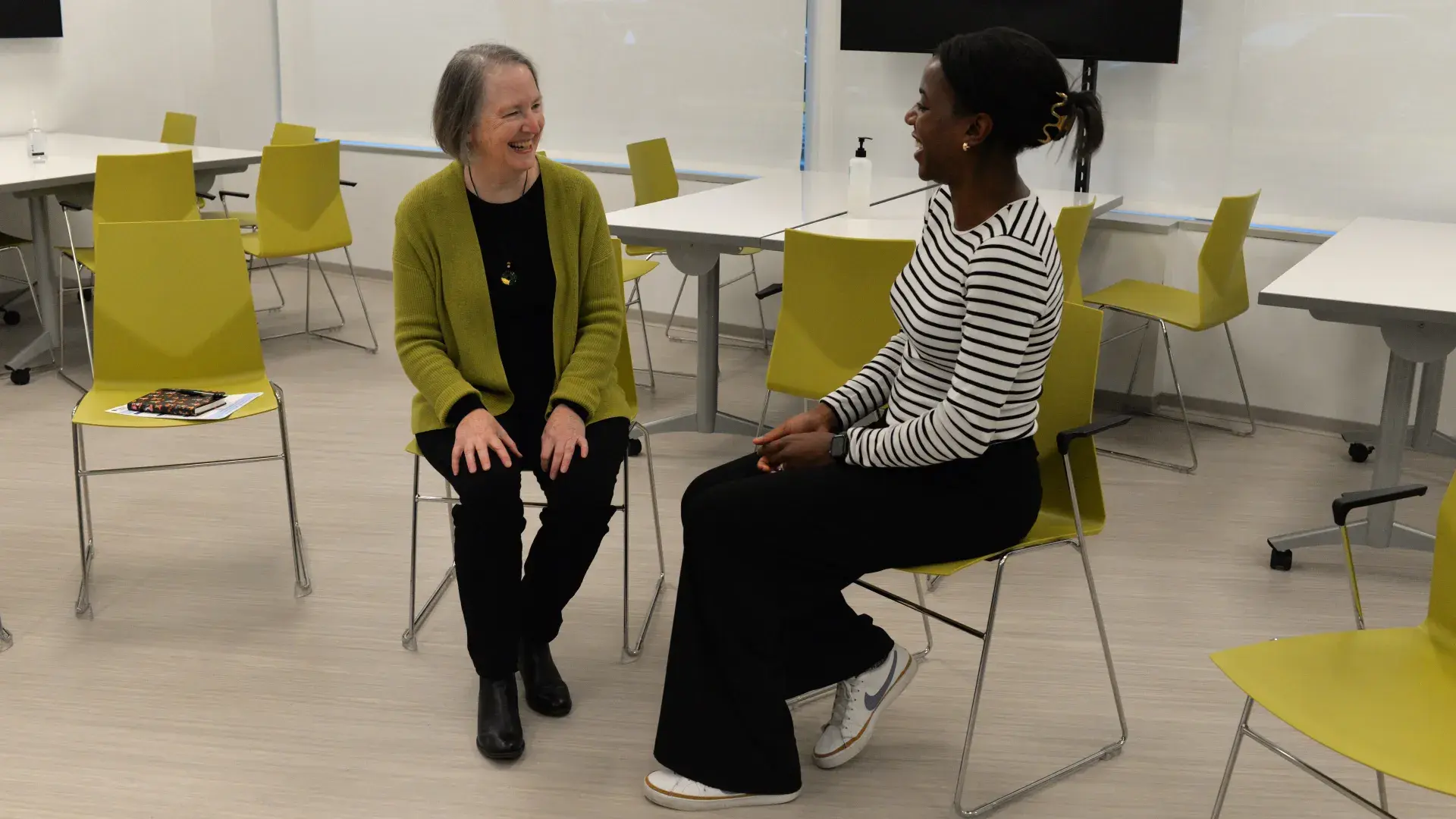
Longtime speech-language pathologist honored by Institute gesture, proud of what Center has become
When Marjorie Nicholas retired from running the Aphasia Center after a 23-year career with the MGH Institute, she knew her name would be mentioned there from time to time because of her impact, the lessons she taught, and because she started the Center in 2002. But never did Nicholas imagine her name would be on the Center permanently.
“No, absolutely not,” chuckled Nicholas, who retired from the MGH Institute in July but still volunteers with the Center every Friday with clients who have aphasia, a language disorder affecting one’s ability to speak, read, and write.
But life has a funny way of working out. From now on, those with Aphasia who come to the MGH Institute for help with their communication will be walking into the Marjorie Nicholas Aphasia Center, named after the woman who played a critical role in making the Center possible in the first place.
“I'm honored that this idea even came up,” said a modest Nicholas, who also retired as Chair of Department of Communication Sciences and Disorders. “I'm extremely pleased, and very honored to have the Aphasia Center named after me.”
The idea seemed like a natural. The Aphasia Center, which is part of the Julie Atwood Speech, Language, and Literacy Center at the Sanders IMPACT Practice Center, is one of the last unnamed centers at the MGH Institute. The naming of the Aphasia Center is part of a $50,000 campaign to raise funds to endow the Center to support its operations in perpetuity. Who better to name it after than the person who founded it, poured in countless hours with students and clients through the years, and who still spends time helping with the conversational support group?
“For her entire career, Marjorie was dedicated to not only improving the lives of patients with aphasia but educating the next generation of speech-language pathologists,” said President Paula Milone-Nuzzo. “The MGH Institute was blessed to have such an esteemed leader in her field, so it’s only fitting her name and legacy live on through the Center she was critical in helping build.”
“This means a lot to me,” said Nicholas. “I didn't come to the Institute knowing that I was going to do this, but it turned out to be something that I think was good for the Institute, for me, for the clients, for the students. And I'm proud of it too. So, I do feel honored that the Center is being named after me.”
The Aphasia Center was created not long after Nicholas arrived from the VA Medical Center in Boston, where she was a research assistant conducting clinical work and researching at the aphasia research center there. She wanted to replicate at the MGH Institute what she had at the VA, so she did.
“I wanted to see if we could create something where people with post-stroke language problems could come and get seen by students and expert clinicians,” recalled Nicholas. “I had a research grant at the time, and one of my research subjects who still attends the Aphasia Center followed me to the Institute when I came. We started with a very small group of one or two people and we met once a week as an aphasia support group.”
The members of the support group were also Nicholas’ research subjects; their presence also met the need for the Institute to create more adult-oriented placements for students.
“At the time, all our on-site programs that we had were focused on child language and child reading disorders,” noted Nicholas. “To have something on site that focused on working with adults who had communication disorders and was supported by the Institute is something I was really grateful for.”
From there, the Center grew organically, from one student working with a couple of Nicholas’ research subjects to dozens of students working with more than 60 clients each semester. The Center also fills an important community need for continued treatment for people with aphasia who have run out of insurance coverage for their stroke-related conditions. Nearly all services offered through the Center are offered pro-bono. Many clients attending the Aphasia Center also receive services through the Physical Therapy, Occupational Therapy, and Nursing Centers that are part of the Sanders IMPACT Practice Center.
In addition to treating those with aphasia, the Center has produced quite a bit of faculty-led research since its inception. Between 2004-2024, research conducted through the Aphasia Center has resulted in over 60 publications and more than 150 scholarly presentations. Topics of research included speech production and music, nonverbal cognition, and life participation approaches.
“The impact over the years has been significant,” said a proud Nicholas. “There's a group of people that are still coming after 20 years. They see their fellow people with aphasia as a family that they've gotten close to. It's that extra socialization and being part of a group where everybody has some degree of language difficulty, and they're supporting each other like any support group. That's what's so valuable for the clients who are coming in, and that's why they continue to come.”
If you would like to make a gift to support the Aphasia Center endowment in honor of Marjorie, you may do so here.
Do you have a story the Office of Strategic Communications should know about? If so, let us know.
